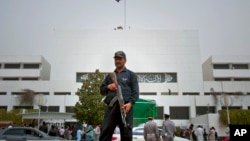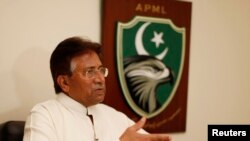ISLAMABAD —
Pakistan’s parliament, and federal and provincial governments voted to power in 2008, have completed their five-year constitutional term. Elections are due in May, setting the stage for the first democratic transition in the country’s history.
Until now, democratically elected governments in Pakistan have not served their full terms, because they were either dislodged by military coups or dismissed by pro-army presidents on charges of misrule and corruption.
The interruptions in democracy have allowed powerful generals to rule for nearly three decades since Pakistan gained independence from Britain in 1947.
The 2008 elections ended a nearly decade-long military intervention by former general Pervez Musharraf. The Pakistan Peoples Party of slain politician Benazir Bhutto won those polls and established a centrist coalition government.
Senior PPP leader Shahnaz Wazir Ali says she believes the full government term will deter future unconstitutional attempts to do away with elected governments.
"We have had a very erratic and a difficult history of the interruption of democratic processes in Pakistan, and therefore this transition of a completion of five-year tenure of a democratic dispensation of elected parliaments in the provinces and the national government is really a landmark for Pakistan’s historical struggle for democracy," she said.
The military is also known for manipulating election results. But former Pakistani information minister Javed Jabbar says the army has been under pressure recently due to its prolonged war against Taliban-led militancy.
He also says the emergence of a "hyper-active" judiciary and independent media has reduced chances of another military coup.
"The overwhelming consensus is that it is not appropriate or warranted for the armed forces to intervene. And secondly, they have their hands full of an internal threat. So they do not have the institutional, intellectual or political capacity to intervene into the entire civil and political domain," he said.
But Jabbar, like many other critics, questions the performance of the elected governments during the past five years.
"We have had an enormous failure of governance. We have witnessed nepotism, corruption and breakdown of law and order. And those are those issues that touched the lives of people on a day-to-day, hour-to-hour basis," he said.
Human-rights activist Farzana Bari says an energy crisis, economic hardships, rising corruption and deteriorating security conditions have frustrated Pakistanis. She fears another five years of a poorly performing elected government could encourage army intervention, but believes democracy is the only solution to Pakistan's problems.
"I think this process needs to be continued. It is sad that this politically elected government has failed people and faltered on every account," she said.
Militant attacks have declined, but mass killings of minority Shi'ites and politically motivated violence in the nation’s largest city and commercial center, Karachi, are cited as threats to the upcoming polls.
Despite the odds, local and foreign observers believe political forces determined to go ahead with the election process have generated a great deal of excitement. Sandra Houston is the country director for U.S.-based National Democratic Institute.
"I think that there is such a strong desire among the public and among the political parties, whether it be at the senior leadership level or be at the grass root district level, to see democracy succeed, and I think that that determination will continue and people would do what they can to make sure that democracy does succeed in these elections," she said.
The outgoing PPP-led coalition government was criticized for not implementing Supreme Court rulings and engaging in legal battles with the fiercely independent judiciary. It was also criticized for refusing to introduce critical economic reforms.
Despite repeated promises, the government also failed to introduce anti-corruption legislation or reform anti-terrorism laws during its five-year term.
Current and possible future political alliances with Islamic parties known for sympathizing with the Taliban and other extremist groups allegedly prevented mainstream political parties from approving changes in the anti-terrorism laws.
Rights activist Tahira Abdullah is skeptical a future civilian government will be able to effectively deal with the threat of religious extremism.
"The way the situation is unfolding in Pakistan today with growing Talibanization, Jihadism and extremism, I do not see any incoming government, which will definitely be a coalition government with a hung parliament the way we see the elections shaping in the next two months, I do not see it happening in the near future," said Abdullah.
In her farewell press conference Thursday, Foreign Minister Hina Rabbani Khar claimed Pakistan’s relations with India saw significant improvement due to the government’s unprecedented diplomatic initiatives.
"We were able to not only talk that message, but walk that message. And I think nowhere is this more manifested in the fact that we changed the 40-year-old policy and decided to completely normalize trade with India. And we hope that as we leave this government, and as the new government will come in place, the political consensus that we were able to bring in parliament will take this [relationship] forward," she said.
NATO forces are set to pull out of neighboring Afghanistan by the end of next year, and many observers believe ambiguity about the post-drawdown situation will also pose a challenge for the future Pakistani government.
Until now, democratically elected governments in Pakistan have not served their full terms, because they were either dislodged by military coups or dismissed by pro-army presidents on charges of misrule and corruption.
The interruptions in democracy have allowed powerful generals to rule for nearly three decades since Pakistan gained independence from Britain in 1947.
The 2008 elections ended a nearly decade-long military intervention by former general Pervez Musharraf. The Pakistan Peoples Party of slain politician Benazir Bhutto won those polls and established a centrist coalition government.
Senior PPP leader Shahnaz Wazir Ali says she believes the full government term will deter future unconstitutional attempts to do away with elected governments.
"We have had a very erratic and a difficult history of the interruption of democratic processes in Pakistan, and therefore this transition of a completion of five-year tenure of a democratic dispensation of elected parliaments in the provinces and the national government is really a landmark for Pakistan’s historical struggle for democracy," she said.
The military is also known for manipulating election results. But former Pakistani information minister Javed Jabbar says the army has been under pressure recently due to its prolonged war against Taliban-led militancy.
He also says the emergence of a "hyper-active" judiciary and independent media has reduced chances of another military coup.
"The overwhelming consensus is that it is not appropriate or warranted for the armed forces to intervene. And secondly, they have their hands full of an internal threat. So they do not have the institutional, intellectual or political capacity to intervene into the entire civil and political domain," he said.
But Jabbar, like many other critics, questions the performance of the elected governments during the past five years.
"We have had an enormous failure of governance. We have witnessed nepotism, corruption and breakdown of law and order. And those are those issues that touched the lives of people on a day-to-day, hour-to-hour basis," he said.
Human-rights activist Farzana Bari says an energy crisis, economic hardships, rising corruption and deteriorating security conditions have frustrated Pakistanis. She fears another five years of a poorly performing elected government could encourage army intervention, but believes democracy is the only solution to Pakistan's problems.
"I think this process needs to be continued. It is sad that this politically elected government has failed people and faltered on every account," she said.
Militant attacks have declined, but mass killings of minority Shi'ites and politically motivated violence in the nation’s largest city and commercial center, Karachi, are cited as threats to the upcoming polls.
Despite the odds, local and foreign observers believe political forces determined to go ahead with the election process have generated a great deal of excitement. Sandra Houston is the country director for U.S.-based National Democratic Institute.
"I think that there is such a strong desire among the public and among the political parties, whether it be at the senior leadership level or be at the grass root district level, to see democracy succeed, and I think that that determination will continue and people would do what they can to make sure that democracy does succeed in these elections," she said.
The outgoing PPP-led coalition government was criticized for not implementing Supreme Court rulings and engaging in legal battles with the fiercely independent judiciary. It was also criticized for refusing to introduce critical economic reforms.
Despite repeated promises, the government also failed to introduce anti-corruption legislation or reform anti-terrorism laws during its five-year term.
Current and possible future political alliances with Islamic parties known for sympathizing with the Taliban and other extremist groups allegedly prevented mainstream political parties from approving changes in the anti-terrorism laws.
Rights activist Tahira Abdullah is skeptical a future civilian government will be able to effectively deal with the threat of religious extremism.
"The way the situation is unfolding in Pakistan today with growing Talibanization, Jihadism and extremism, I do not see any incoming government, which will definitely be a coalition government with a hung parliament the way we see the elections shaping in the next two months, I do not see it happening in the near future," said Abdullah.
In her farewell press conference Thursday, Foreign Minister Hina Rabbani Khar claimed Pakistan’s relations with India saw significant improvement due to the government’s unprecedented diplomatic initiatives.
"We were able to not only talk that message, but walk that message. And I think nowhere is this more manifested in the fact that we changed the 40-year-old policy and decided to completely normalize trade with India. And we hope that as we leave this government, and as the new government will come in place, the political consensus that we were able to bring in parliament will take this [relationship] forward," she said.
NATO forces are set to pull out of neighboring Afghanistan by the end of next year, and many observers believe ambiguity about the post-drawdown situation will also pose a challenge for the future Pakistani government.

